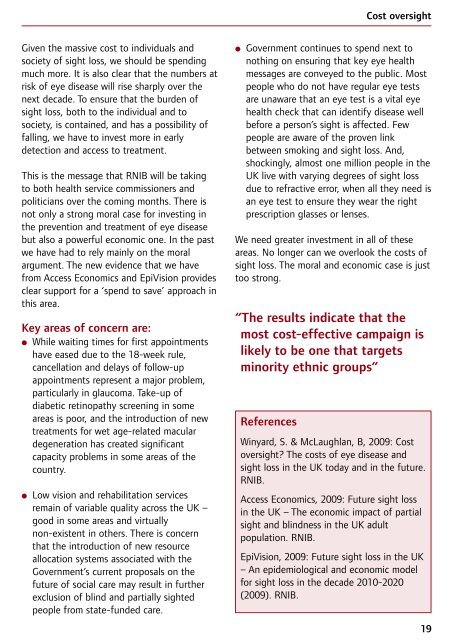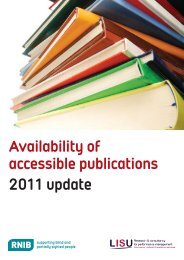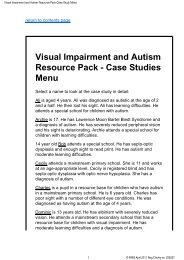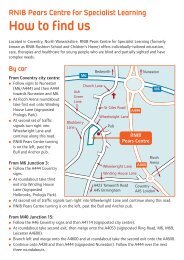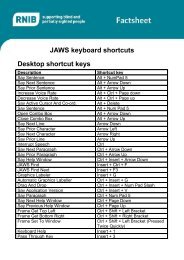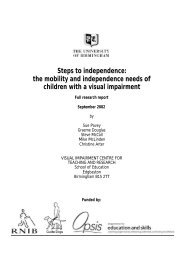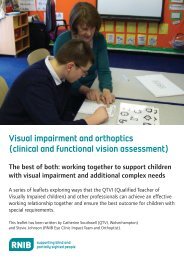Reflections on sight loss - RNIB
Reflections on sight loss - RNIB
Reflections on sight loss - RNIB
Create successful ePaper yourself
Turn your PDF publications into a flip-book with our unique Google optimized e-Paper software.
Cost over<strong>sight</strong><br />
Given the massive cost to individuals and<br />
society of <strong>sight</strong> <strong>loss</strong>, we should be spending<br />
much more. It is also clear that the numbers at<br />
risk of eye disease will rise sharply over the<br />
next decade. To ensure that the burden of<br />
<strong>sight</strong> <strong>loss</strong>, both to the individual and to<br />
society, is c<strong>on</strong>tained, and has a possibility of<br />
falling, we have to invest more in early<br />
detecti<strong>on</strong> and access to treatment.<br />
This is the message that <strong>RNIB</strong> will be taking<br />
to both health service commissi<strong>on</strong>ers and<br />
politicians over the coming m<strong>on</strong>ths. There is<br />
not <strong>on</strong>ly a str<strong>on</strong>g moral case for investing in<br />
the preventi<strong>on</strong> and treatment of eye disease<br />
but also a powerful ec<strong>on</strong>omic <strong>on</strong>e. In the past<br />
we have had to rely mainly <strong>on</strong> the moral<br />
argument. The new evidence that we have<br />
from Access Ec<strong>on</strong>omics and EpiVisi<strong>on</strong> provides<br />
clear support for a ‘spend to save’ approach in<br />
this area.<br />
Key areas of c<strong>on</strong>cern are:<br />
● While waiting times for first appointments<br />
have eased due to the 18-week rule,<br />
cancellati<strong>on</strong> and delays of follow-up<br />
appointments represent a major problem,<br />
particularly in glaucoma. Take-up of<br />
diabetic retinopathy screening in some<br />
areas is poor, and the introducti<strong>on</strong> of new<br />
treatments for wet age-related macular<br />
degenerati<strong>on</strong> has created significant<br />
capacity problems in some areas of the<br />
country.<br />
●<br />
Low visi<strong>on</strong> and rehabilitati<strong>on</strong> services<br />
remain of variable quality across the UK –<br />
good in some areas and virtually<br />
n<strong>on</strong>-existent in others. There is c<strong>on</strong>cern<br />
that the introducti<strong>on</strong> of new resource<br />
allocati<strong>on</strong> systems associated with the<br />
Government’s current proposals <strong>on</strong> the<br />
future of social care may result in further<br />
exclusi<strong>on</strong> of blind and partially <strong>sight</strong>ed<br />
people from state-funded care.<br />
●<br />
Government c<strong>on</strong>tinues to spend next to<br />
nothing <strong>on</strong> ensuring that key eye health<br />
messages are c<strong>on</strong>veyed to the public. Most<br />
people who do not have regular eye tests<br />
are unaware that an eye test is a vital eye<br />
health check that can identify disease well<br />
before a pers<strong>on</strong>’s <strong>sight</strong> is affected. Few<br />
people are aware of the proven link<br />
between smoking and <strong>sight</strong> <strong>loss</strong>. And,<br />
shockingly, almost <strong>on</strong>e milli<strong>on</strong> people in the<br />
UK live with varying degrees of <strong>sight</strong> <strong>loss</strong><br />
due to refractive error, when all they need is<br />
an eye test to ensure they wear the right<br />
prescripti<strong>on</strong> glasses or lenses.<br />
We need greater investment in all of these<br />
areas. No l<strong>on</strong>ger can we overlook the costs of<br />
<strong>sight</strong> <strong>loss</strong>. The moral and ec<strong>on</strong>omic case is just<br />
too str<strong>on</strong>g.<br />
“The results indicate that the<br />
most cost-effective campaign is<br />
likely to be <strong>on</strong>e that targets<br />
minority ethnic groups”<br />
References<br />
Winyard, S. & McLaughlan, B, 2009: Cost<br />
over<strong>sight</strong>? The costs of eye disease and<br />
<strong>sight</strong> <strong>loss</strong> in the UK today and in the future.<br />
<strong>RNIB</strong>.<br />
Access Ec<strong>on</strong>omics, 2009: Future <strong>sight</strong> <strong>loss</strong><br />
in the UK – The ec<strong>on</strong>omic impact of partial<br />
<strong>sight</strong> and blindness in the UK adult<br />
populati<strong>on</strong>. <strong>RNIB</strong>.<br />
EpiVisi<strong>on</strong>, 2009: Future <strong>sight</strong> <strong>loss</strong> in the UK<br />
– An epidemiological and ec<strong>on</strong>omic model<br />
for <strong>sight</strong> <strong>loss</strong> in the decade 2010-2020<br />
(2009). <strong>RNIB</strong>.<br />
19


